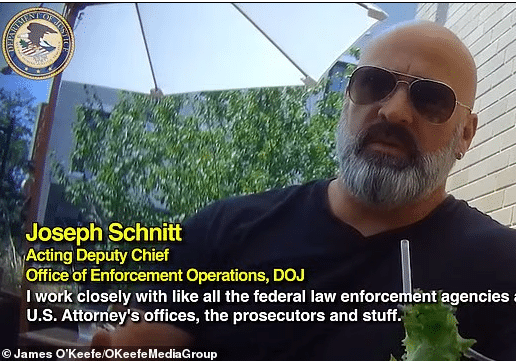Names of Republican Pedophile Suspects Connected to Jeffrey Epstein Will Be Redacted and Kept Secret, Democrats Exposed

A Department of Justice official was secretly recorded by an undercover journalist making unsubstantiated claims about how the Trump administration would handle the release of Jeffrey Epstein files, sparking new controversy over the long-awaited document disclosure.
The Hidden Camera Recording
Joseph Schnitt, acting deputy chief at the DOJ’s Office of Enforcement Operations, was recorded during what he believed to be dates with a woman he met on the dating app Hinge. The recordings were published by James O’Keefe, founder of Project Veritas, known for controversial sting operations targeting progressive groups and government officials.
In the video, Schnitt claims there are “thousands and thousands of pages” of Epstein-related files and alleges that if released, “they’ll redact every Republican or conservative person” while leaving “all the liberal, Democratic people in those files.” He also suggested there was “internal conflict” within the Trump administration over handling the documents.
Schnitt made additional claims about Ghislaine Maxwell’s recent transfer to a minimum security facility, suggesting it violated Bureau of Prisons policy for convicted sex offenders and implying she received benefits to “keep her mouth shut.”
DOJ Response and Damage Control
The Department of Justice quickly distanced itself from Schnitt’s comments, issuing multiple statements clarifying that he had “no role in the Department’s internal review of Epstein materials.” The DOJ emphasized that his comments “have absolutely zero bearing with reality and reflect a total lack of knowledge of the DOJ’s review process.”
In his own written statement, Schnitt said he met “Skylar” through the dating app and had no indication she was a journalist recording their conversations. He claimed his comments were “personal comments on what I’ve learned in the media and not from anything I’ve done at or learned via work.”
Political Pressure and Congressional Action
The recording emerged amid growing pressure from both sides of the political aisle for full disclosure of Epstein files. Republican Representative Thomas Massie of Kentucky has been leading efforts to force document release through a discharge petition, claiming he has gathered 215 of the 218 signatures needed to compel a floor vote.
Massie has accused the Trump administration of protecting wealthy donors who may be mentioned in the files. He specifically named financier John Paulson, who hosted Trump’s record-setting $50.5 million fundraiser, as being “in Epstein’s black book,” though he clarified he was not suggesting Paulson committed any crimes. Paulson’s representatives flatly deny any connection to Epstein.
Broader Context and Conspiracy Theories
The Epstein case has become a flashpoint for conspiracy theories, particularly among Trump supporters who believe files are being suppressed to protect high-profile accomplices. In July, the DOJ and FBI released a statement saying Epstein had “no incriminating ‘client list,’” which angered some Trump supporters who expected more comprehensive disclosures.
Trump had previously pledged during his campaign to release Epstein files if elected, making the administration’s handling of the documents particularly sensitive politically. The delay has created rare criticism of Trump from within his own MAGA movement.
Questions About Credibility
The source of these claims raises significant credibility concerns. James O’Keefe has a history of selectively editing recordings and making misleading claims through Project Veritas operations. Courts have previously found some of his work to be deceptive, and he was ousted from Project Veritas in 2023 amid internal disputes.
Additionally, Schnitt’s own admission that his comments were based on media reports rather than inside knowledge undermines the significance of his claims. The DOJ has emphasized that he had no access to Epstein-related materials or decision-making processes.
Ongoing Congressional Efforts
Despite questions about the recording’s reliability, it has intensified congressional pressure for transparency. Representatives Massie and Democrat Ro Khanna continue pushing their “Epstein Files Transparency Act,” which would require disclosure of all unclassified records related to Epstein and Maxwell cases.
The House Oversight Committee has already released some documents following a subpoena, though Massie characterized the release as insufficient, saying “most of the documents they released were already publicly available.”
Implications for the Administration
Whether accurate or not, the recording creates additional political headaches for the Trump administration as it navigates demands for transparency while managing potential national security and privacy concerns. The episode highlights the challenges of balancing public interest in disclosure with proper handling of sensitive investigative materials.
The controversy also demonstrates how conspiracy theories and hidden camera operations can shape public discourse around high-profile cases, regardless of the underlying evidence or credibility of the sources involved.




